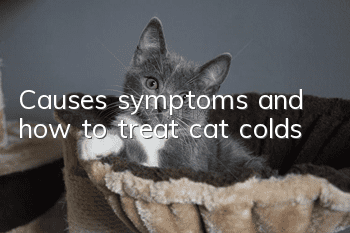Causes, symptoms and how to treat cat colds

Like people, cats can catch colds. Cat cold refers to an upper respiratory tract infection in cats. Feline upper respiratory tract infection (URI) affects the cat's nasal cavity, sinuses, mouth, pharynx, and larynx. Cat colds are caused by viruses or bacteria. If you hear your cat sneezing and also notice a runny nose, watery eyes, congestion, cough, or fever, this could be a sign that she has a cold.
Causes of Cat Colds
The two most common viruses that cause colds in cats are feline herpesvirus and feline calicivirus (FCV). Feline herpesvirus type 1 (FHV-1) is responsible for 80% to 90% of contagious upper respiratory tract infections in cats. While there are vaccines for feline herpesvirus and feline calicivirus (both are part of a combination vaccine against feline panleukopenia virus), these vaccines do not provide complete immunity. Just like humans can get the flu even after receiving the flu shot, cats can get a cold due to infection with the feline herpes virus or feline calicivirus. However, vaccinated cats have milder symptoms than unvaccinated cats.
Two common bacteria that cause colds in cats are Chlamydia felis, formerly known as Chlamydia psittaci and Bordetella bronchiseptica. Conjunctivitis (inflammation of the mucous membranes of the eyes and eyelids) and watery eyes often result. Bordetella can cause fever, sneezing, coughing, runny nose and eyes. There is a vaccine against Bordetella that is usually recommended for high-risk cats.
Can cat colds be transmitted to humans?
Although people can catch colds and cats can catch colds, the viruses and bacteria that cause colds are not the same between species. Whether you have a human cold or your cat has a feline cold, hold your cat with confidence so you don't spread the cold. Although it is not considered a "cold," it should be noted that the novel coronavirus (COVID-19), which first appeared in late 2019 and spread rapidly around the world, has been shown to be transmitted from humans to cats.
As of the date of this article, there is no evidence that cats can transmit COVID-19 to humans. Additionally, in a study of cats, none of the cats infected with COVID-19 developed severe symptoms of the disease, and no cats infected with COVID-19 died during the researchers' follow-up. But we should consider taking steps to keep COVID-19 patients at an appropriate distance from companion animals such as cats and dogs. If you or a family member is diagnosed with COVID-19, you should consider steps to protect pets in your home. While the common cat cold is not contagious to humans, it can be passed on to other cats. Sick cats sharing a water bowl, food bowl and catWhen in the litter box, the cold can be passed on to other cats.
Symptoms of cat cold
The symptoms of a cat cold are very similar to those of a human cold. If you see one or more of the following signs, your sick cat may have a cold:
Runny nose (clear or colored nasal discharge)
Crying (clear or colored eye fluid)
Nasal congestion
Sneeze
Cough
Fever
Loss of appetite
Drowsiness
Difficulty breathing
Diagnosing cat colds
If you think your cat has a cold, make an appointment with your veterinarian. Other illnesses can cause symptoms similar to those of a cat cold, so your veterinarian will give your cat a complete physical exam, carefully examining your cat's eyes, ears, and mouth, as well as listening to the lungs, before making a diagnosis. But cat colds can sometimes get worse. Cats infected with the virus can also develop secondary bacterial infections, which can lead to pneumonia. It's important to get your cat checked out when you see cold symptoms, especially if your cat isn't eating or drinking normally or if she's showing signs of difficulty breathing (shortness of breath, panting, mouth breathing, panting) , difficulty breathing or wheezing). If your veterinarian suspects you have pneumonia, he may recommend a chest X-ray.
How to treat cat cold?
Depending on your cat's symptoms, your veterinarian may prescribe medications such as oral antibiotics and/or eye drops or ointments. If your veterinarian suspects your cat has a cold caused by a virus, treatment may include antiviral medications. If your cat becomes seriously ill or dehydrated, she may need to be admitted to the hospital for supportive care, including intravenous fluids and monitoring. You should keep an infected cat away from other cats until the cold is completely gone.
Home Remedies for Cat Colds
If your cat has a cold, there are some things you can do at home to help reduce your cat's discomfort. A humidifier can relieve congestion. Alternatively, you can put your cat in the bathroom with the door closed and hot water so she can inhale the steam (do this several times a day for 10 to 15 minutes each time). If your cat has a lot of nasal discharge, wipe her nose with a soft, clean cloth soaked in warm water or a damp cotton ball several times a day. Encourage your cat to eat and drink more by offering your cat's favorite foods and sprinkling low-sodium chicken broth or tuna juice into his water.
How long does a cat cold last?
Most cats will fully recover from a cold within a week or two, butSome cats' colds can take up to three weeks to completely clear up. If your cat's cold doesn't get better, call your veterinarian.
Will cats recover from a cold?
Mild colds in cats may go away on their own without treatment. However, because feline colds can worsen and develop into more serious infections, it is important to seek veterinary treatment if your cat's cold persists for more than a few days, especially if symptoms do not improve. If your cat's cold symptoms become more severe, don't delay making a veterinary appointment, no matter how long the cold has been going on.
- Cat is in good spirits but doesn’t like to eat
- A cat purrs. What does it mean when a cat purrs?
- How to choose a cat sedative! Everything you need to know about cat sedation!
- What should I do if my cat keeps running out when I open the door?
- What are the personality traits of tabby Siamese cats?
- How to teach a cat to use the litter box? Train a cat to use the litter box to go to the toilet!
- What should you do if your Ragdoll cat doesn’t eat cat food? I’ll teach you a few ways to do it easily!
- Why do cats like to eat geckos?
- It usually takes a few months to raise a cat
- Spring is here, what should I do when my cat changes hair?



